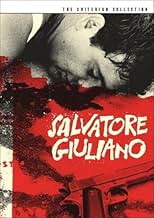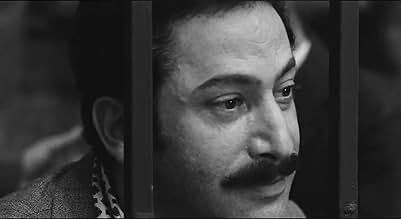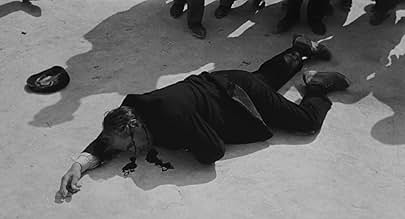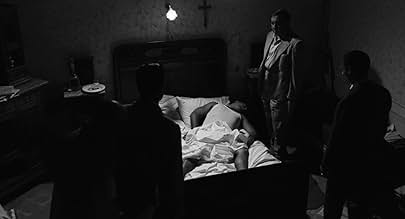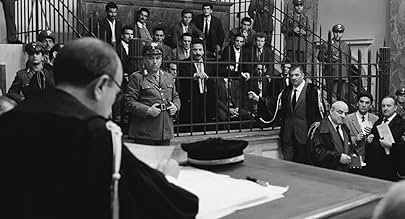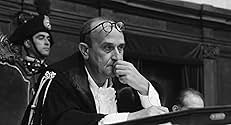VALUTAZIONE IMDb
7,3/10
5247
LA TUA VALUTAZIONE
Le complicazioni tra i poteri del governatore, il partito di indipendenza e la mafia nella Sicilia degli anni '40 culminano con la morte di Salvatore Giuliano.Le complicazioni tra i poteri del governatore, il partito di indipendenza e la mafia nella Sicilia degli anni '40 culminano con la morte di Salvatore Giuliano.Le complicazioni tra i poteri del governatore, il partito di indipendenza e la mafia nella Sicilia degli anni '40 culminano con la morte di Salvatore Giuliano.
- Regia
- Sceneggiatura
- Star
- Premi
- 6 vittorie e 4 candidature totali
Frederico Zardi
- Pisciotta's Defense Counsel
- (non citato nei titoli originali)
Pippo Agusta
- Minor Role
- (non citato nei titoli originali)
Sennuccio Benelli
- Reporter
- (non citato nei titoli originali)
Giuseppe Calandra
- Minor Official
- (non citato nei titoli originali)
Pietro Cammarata
- Salvatore Giuliano
- (non citato nei titoli originali)
Max Cartier
- Francesco
- (non citato nei titoli originali)
Nando Cicero
- Bandit
- (non citato nei titoli originali)
Pietro Franzone
- Seperatist
- (non citato nei titoli originali)
Giovanni Gallina
- Bit Part
- (non citato nei titoli originali)
Vincenzo Norvese
- Bit Part
- (non citato nei titoli originali)
Carmelo Oliviero
- Don Nitto Minasola
- (non citato nei titoli originali)
Renato Pinciroli
- Pinciroli
- (non citato nei titoli originali)
Francesco Rosi
- Narrator
- (voce)
- (non citato nei titoli originali)
Giuseppe Teti
- Priest of Montelepre
- (non citato nei titoli originali)
Cosimo Torino
- Frank Mannino
- (non citato nei titoli originali)
Recensioni in evidenza
A perfect analysis of the most famous gangster, loved from the poor people, of Sicily. Is very good the acting of Frank Wolff as the cousin of Giuliano, Salvatore Pisciotta. On this Film there is the same history of the gangster of the Film "Il Siciliano" with C. Lambert, but here the film is history, there the film is a bad novel.
This remarkable movie reminded me of early Eisenstein for the fluid, dynamic
movement of crowds--in the streets, in the movement of soldiers and bandits across the hilly terrain, and in the scene of the Portella della Ginestre massacre. The back-and-forth narrative structure must have influenced Costa-Gavras in the making of "Z." And Rosi's ability to get riveting performances from non-professionals (some of whom could not read scripts) is astonishing. The story line gets confusing, but I think that's because the situation was confusing--multiple betrayals and layers of
corruption and complicity--rather than a flaw in the script or editing. Visually exciting, too--the use of distancing overhead shots, the quiet menace of gunmen walking up a deserted, sun-baked street... memorable stuff.
movement of crowds--in the streets, in the movement of soldiers and bandits across the hilly terrain, and in the scene of the Portella della Ginestre massacre. The back-and-forth narrative structure must have influenced Costa-Gavras in the making of "Z." And Rosi's ability to get riveting performances from non-professionals (some of whom could not read scripts) is astonishing. The story line gets confusing, but I think that's because the situation was confusing--multiple betrayals and layers of
corruption and complicity--rather than a flaw in the script or editing. Visually exciting, too--the use of distancing overhead shots, the quiet menace of gunmen walking up a deserted, sun-baked street... memorable stuff.
Filmed in the actual Siciilian locations, this film is a fair attempt to strip away the myth surrounding bandit-cum-revolutionary Giuliano. In fact, he doesn't appear except as a gunned-down corpse at the beginning. The film winds back to unravel the events leading to his death, and forwards to its consequence. This is a clever method of achieving objectivity while at the same time subtly emphasising the man's elusive and mysterious qualities. To show Giuliano would have either been either hagiography or iconoclasm. The film rose above that and broadened its inquiry into the wider social and political context, effectively belittling him as the puppet of various forces jostling for position in Sicily after the war: bandits, police, local aristocracy, the Italian government, communists, and the Mafia.
This sets quite a challenge for itself, partly because of the vacuum at its centre, partly because of the obscurity and complexity of the real events. We are delivered to a chaotic courtroom to try to piece it together. The film finally latches onto Giuliano's lieutenant the only one who seems to know something of what is going on - but even he is silenced. It's all the more disturbing for the confusion.
Rosi is one of the best directors of crowds scenes and he gives raucous energy to any gathering of men, especially in the courtroom. He induces a kind of group hysteria in his actors; they are totally unaware of the camera and the result is an almost disturbing hyper-real feel (real crowds are dull in comparison) it's really something to appreciate. To get into this film, you need to invest something in the passions of the various parties involved - if not sympathise with them, then at least understand them. Without this, the danger is that it all boils down to so much petty bickering. The same might be said of the Godfather, which clearly owes a huge debt to Rosi's style.
Influential then, somewhat brave, with some fine directorial moments, and an interesting history lesson. Hard to actually like, but hard not to admire.
This sets quite a challenge for itself, partly because of the vacuum at its centre, partly because of the obscurity and complexity of the real events. We are delivered to a chaotic courtroom to try to piece it together. The film finally latches onto Giuliano's lieutenant the only one who seems to know something of what is going on - but even he is silenced. It's all the more disturbing for the confusion.
Rosi is one of the best directors of crowds scenes and he gives raucous energy to any gathering of men, especially in the courtroom. He induces a kind of group hysteria in his actors; they are totally unaware of the camera and the result is an almost disturbing hyper-real feel (real crowds are dull in comparison) it's really something to appreciate. To get into this film, you need to invest something in the passions of the various parties involved - if not sympathise with them, then at least understand them. Without this, the danger is that it all boils down to so much petty bickering. The same might be said of the Godfather, which clearly owes a huge debt to Rosi's style.
Influential then, somewhat brave, with some fine directorial moments, and an interesting history lesson. Hard to actually like, but hard not to admire.
Interesting neo-realistic, quasi-documentary film with notable editing. But did the film deserve the Best Director award at Berlin over Bergman's "Through a glass darkly"? The Swedish film was superior. Martin Scorsese likes it because he can identify with the Italian politics and sociology of that time. The Rosi film is good but overrated.
Francesco Rosi's elliptical film about the notorious Sicilian gangster is quite stunning. This is not, however, a typical gangster film. This film is more about the lives of the people affected by Giuliano than about the gangster himself and this is given extra resonance by the casting of the real villagers in almost all cases. The fact that we never see Giuliano's face makes the director's intentions quite clear.
Giuliano began his professional criminal career when he was caught stealing at a young age and chased out of his village into the surrounding hills where he formed a gang and made a living from robberies and standover tactics. He became feared and respected by the locals and was eventually recruited by regional officials to help in the fight for independence from Italy. The first half of the film explores these events and manages to convey an extremely strong feeling for the time and place. The second half of the film deals with the trial of the surviving members of Giuliano's gang after his death and in doing so illuminates much of what has come before.
It is remarkable how well the film holds together considering the amount of different styles and techniques that were combined in its creation. There are elements of docudrama, courtroom drama, Italian neorealism, crime story and political tract. It is also surprising how well it holds up over forty years later.
Giuliano began his professional criminal career when he was caught stealing at a young age and chased out of his village into the surrounding hills where he formed a gang and made a living from robberies and standover tactics. He became feared and respected by the locals and was eventually recruited by regional officials to help in the fight for independence from Italy. The first half of the film explores these events and manages to convey an extremely strong feeling for the time and place. The second half of the film deals with the trial of the surviving members of Giuliano's gang after his death and in doing so illuminates much of what has come before.
It is remarkable how well the film holds together considering the amount of different styles and techniques that were combined in its creation. There are elements of docudrama, courtroom drama, Italian neorealism, crime story and political tract. It is also surprising how well it holds up over forty years later.
Lo sapevi?
- QuizMartin Scorsese credits this film as being one of his many inspirational sources for the look and style of his Taxi Driver (1976).
- BlooperWhen his mother comes to view and identify his corpse, Salvatore's stomach clearly moves as the actor struggles to control his breathing.
- ConnessioniEdited into Il sasso in bocca (1970)
I più visti
Accedi per valutare e creare un elenco di titoli salvati per ottenere consigli personalizzati
- How long is Salvatore Giuliano?Powered by Alexa
Dettagli
- Data di uscita
- Paese di origine
- Lingua
- Celebre anche come
- Sicilia 1943-60
- Luoghi delle riprese
- 98 Via Serafino Mannone, Castelvetrano, Trapani, Sicily, Italia(Giuliano's body)
- Aziende produttrici
- Vedi altri crediti dell’azienda su IMDbPro
- Tempo di esecuzione2 ore 3 minuti
- Colore
- Mix di suoni
- Proporzioni
- 1.85 : 1
Contribuisci a questa pagina
Suggerisci una modifica o aggiungi i contenuti mancanti

Divario superiore
By what name was Salvatore Giuliano (1962) officially released in Canada in English?
Rispondi
